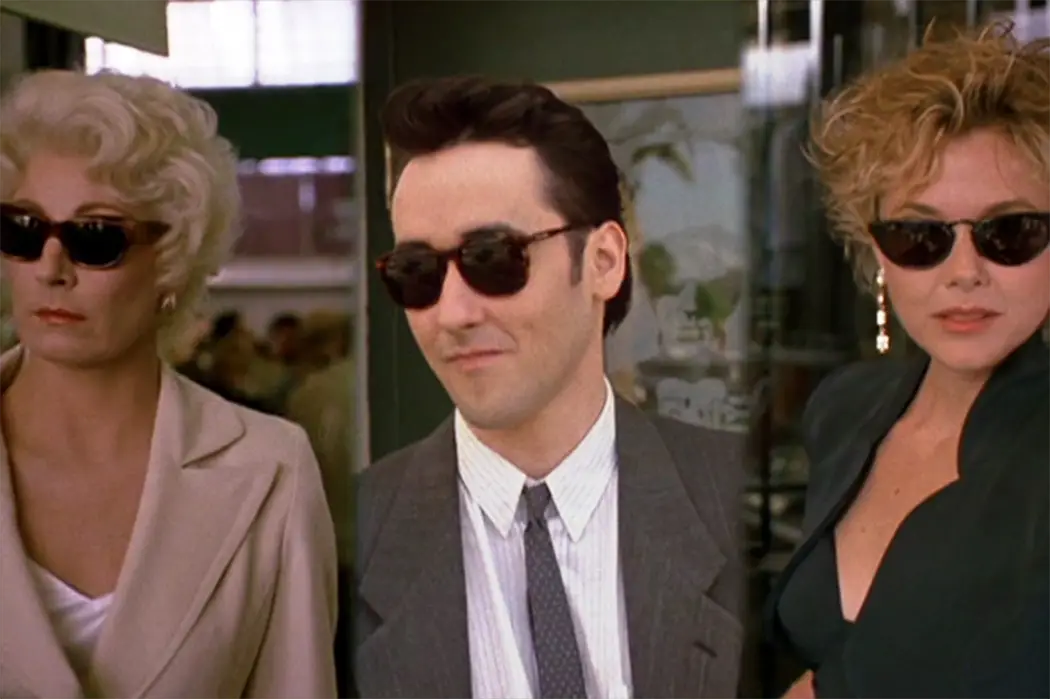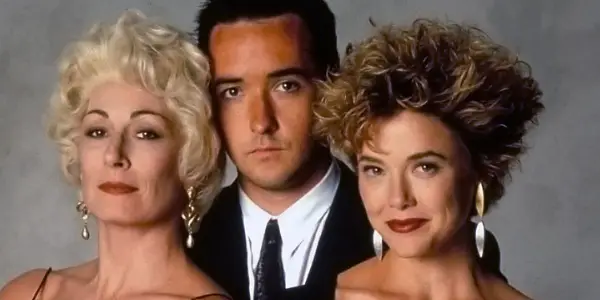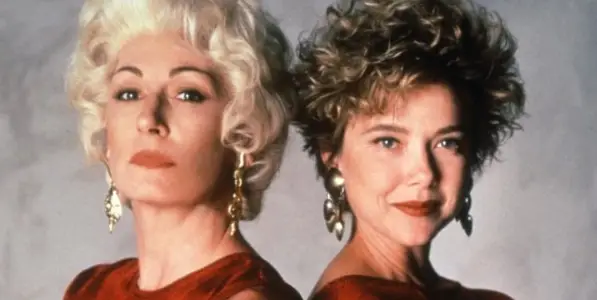Revisiting Stephen Frears’ THE GRIFTERS

Tara Martinez is a New York-based writer with a passion…
Who doesn’t love a good con-man movie, especially if it’s tinged with a bit of film noir nostalgia for us film buffs to chew on? Well, that’s exactly what you get with Stephen Frears’ 1990 gem The Grifters. Based on the novel of the same name by Jim Thompson, The Grifters gives audiences a delicious taste of taboo from the other side of the tracks.
The Grifters follows Roy Dillon (John Cusack), a small-time con artist who finds himself with a bat to his stomach in the first five minutes of the film. As Roy falls ill, his estranged con artist mother Lilly (Anjelica Huston) just so happens to pop up and get him to the hospital where she meets her doppelganger Myra Langtry (Annette Benning) – Roy’s girlfriend and con woman herself.
This chain of events leads all three down the rabbit hole of living a grifter’s life. Each of them is constantly running away from the scene of their last con to try and catch up with themselves, only to fall even further behind with each misstep they take.
While it may not be a classic like Sunset Boulevard or Double Indemnity, The Grifters has its place among the great film noirs in more recent history. From the dialogue to the score to the performances, The Grifters delivers a complex, no-holds-barred story that is intriguingly repulsive.
And here, we’ll explore what makes this tale of manipulation, taboo, and incest such a solid film.
The Story’s in the Dialogue
There are many who would argue that The Grifters is simply a boring film. “Nothing happens!” they might say. But so much of the narrative and the characters’ motivations are hidden in the dialogue. Where the action may be slow, the dynamic between and among characters is what moves the film forward in strange and interesting ways.
The dialogue is whip-fast and whip-smart, suggesting that each of the characters knows the score even before the game is over. We, the audience, however, do not and it makes keeping up with the dialogue, the story, and these characters all the more challenging.

Never once are we given the hint that the circus of manipulation and emotion surrounding Lilly, Roy, and Myra might come to a terrible end. We’re kept on the edge of our seats, waiting to see how all of it unfolds. And as we do, we’re forced to ask ourselves a mountain of strangely complex questions: Can Myra actually convince Roy to take on bigger cons and bigger risks than he’s used to? Is Roy sexually attracted to his own mother? Will any of these people come out of this thing alive?
Cinematography: An Extension of the Story
At its core, The Grifters is a film about survival and what one must do in order to get ahead. For Roy, Lilly, and Myra – who are all involved in a love triangle of sorts – survival means different things at different points of the story. But there’s one thing they’re all on the same page about: they’re ultimately trapped by the lives they’ve chosen for themselves.
The cinematography lends itself beautifully to this narrative. At every turn, the characters are always boxed in. We see them on crowded trains, in telephone booths, in elevators – wherever the outside is just an arm’s length away. But never are they allowed to break free.
This is perfectly demonstrated by a disturbing scene in which Lilly is brutalized for having not been honest with her mob boss Bobo Justus. Afterwards, Bobo takes her outside on a balcony to get some fresh air. As the scene comes to a close, we see her reenter the room where all of that brutality took place. It suggests that although Lilly can sense the freedom and goodness of the outside, she will always choose the danger of living on the other side of it. It’s a hard truth that each character has or will come to accept about themselves as the film charges forward.
What’s the Score?
Music is, no doubt, integral to the impact of any film. It breathes life into the silences between characters and acts as a character all its own. Elmer Bernstein’s theme fills The Grifters with a perfect blend of mystery and foreboding. As each character tiptoes around each other, the audience does too. It’s as if we’re peaking around the corner, waiting for the unexpected to happen.

From the film’s score alone, we can almost get a sense that maybe bad things are going to happen. Just maybe, one of these characters that we’ve come to know isn’t going to make it. So, where the script and the dialogue leave things open for interpretation, one could say that the score does not. It’s a great example of how so many different aspects of one film can come together to make a cohesive whole.
And the award goes to…
Both Anjelica Huston and Annette Bening were nominated for Academy Awards for their roles in The Grifters. Neither actress won, but if either was deserving, it was most certainly Huston. As Lilly Dillon, Huston is so raw and gritty that she seemingly relinquishes her identity to transform into one of the worst mothers in film history. Bening, too, has her moments in the film. She’s seductively coy and it’s easy to see why and how Roy might’ve fallen for her.
In many ways, John Cusack’s character Roy acts as a middleman for Lilly and Myra. And that’s well demonstrated through Cusack’s performance. As an actor, Cusack balances both actresses out – he often matches Huston’s intensity and also lets himself resign to the slyness of Bening’s femme fatale. All in all, each of the three leads shine in this film.
Conclusion
Unless exploring the works of Stephen Frears or Anjelica Huston or John Cusack, it’s difficult to find references to The Grifters. It’s a film that’s largely been lost to time and bigger budget films. One thing that examining a film like this teaches us is that making films is no easy feat. And when a director like Stephen Frears can succeed at bringing so many talented people together to create an Oscar-worthy movie, it’s certainly worth talking about.
If you’ve seen The Grifters, do you consider it a worthwhile film? If not, has this write-up changed your perception at all?
Does content like this matter to you?
Become a Member and support film journalism. Unlock access to all of Film Inquiry`s great articles. Join a community of like-minded readers who are passionate about cinema - get access to our private members Network, give back to independent filmmakers, and more.
Tara Martinez is a New York-based writer with a passion for pop culture and a penchant for analysis. She frequently covers film, television, and representations of women in the media.













